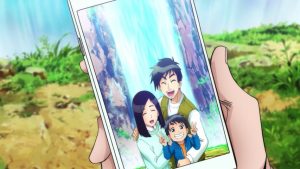 My Sunday nights are always a little better when Gegege no Kitarou delivers one of its standout episodes. And there have been quite a lot of them, really – yeah it’s working on cour #6 so the law of averages is an ally here, but in terms of sheer gross tonnage of good anime over those 6 cours GGGnK is compiling an impressive library of quality. This was a really solid and supremely in-character episode thematically, though the art style was a bit of a one-off (I’m assuming a guest A.D. or some such).
My Sunday nights are always a little better when Gegege no Kitarou delivers one of its standout episodes. And there have been quite a lot of them, really – yeah it’s working on cour #6 so the law of averages is an ally here, but in terms of sheer gross tonnage of good anime over those 6 cours GGGnK is compiling an impressive library of quality. This was a really solid and supremely in-character episode thematically, though the art style was a bit of a one-off (I’m assuming a guest A.D. or some such).
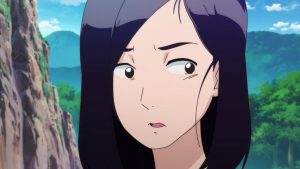 There’s no question what this episode is really about – “the darkness in human hearts”. It’s what starts the episode, what finishes it, and everything in-between. And housewife Tatsukawa Shouko (Tsunematsu Ayumi, making her Gegege no debut) has plenty of it to go around. She’s about to off herself as the episode begins, in fact, by throwing herself into the waterfall she posed in front of with her husband (Kanemoto Ryousuke) and son Ren (Kawaguchi Sakura). Shouko’s life is a living hell – her husband has just been suspended and blames her for forcing him to move to this town. Her son’s bullying has gotten worse and he blames her for reporting it to the school). And the local women’s association (these are legendary horror shows in Japan) uses her as its favorite target for humiliation.
There’s no question what this episode is really about – “the darkness in human hearts”. It’s what starts the episode, what finishes it, and everything in-between. And housewife Tatsukawa Shouko (Tsunematsu Ayumi, making her Gegege no debut) has plenty of it to go around. She’s about to off herself as the episode begins, in fact, by throwing herself into the waterfall she posed in front of with her husband (Kanemoto Ryousuke) and son Ren (Kawaguchi Sakura). Shouko’s life is a living hell – her husband has just been suspended and blames her for forcing him to move to this town. Her son’s bullying has gotten worse and he blames her for reporting it to the school). And the local women’s association (these are legendary horror shows in Japan) uses her as its favorite target for humiliation.
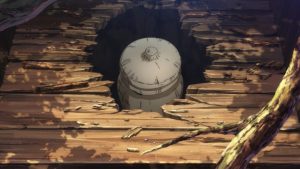 There’s a common thread behind all this, but we’ll get to that in a minute. Before Shouko can end it she hears a voice summoning her towards a cave – it knows her name, and it knows her suffering. This is Suiko (6-time GGGnK veteran Egawa Hisao delivers a great performance here) and he tells Shouko that if she frees him from the urn in which he’s sealed, he’ll end her torment. One could mock her for opening the urn, but the fact it Shouko fully expects to be devoured – she just doesn’t care. This seems to impress the Suiko, who declares that he’ll honor the promise he made to her and “set her free”.
There’s a common thread behind all this, but we’ll get to that in a minute. Before Shouko can end it she hears a voice summoning her towards a cave – it knows her name, and it knows her suffering. This is Suiko (6-time GGGnK veteran Egawa Hisao delivers a great performance here) and he tells Shouko that if she frees him from the urn in which he’s sealed, he’ll end her torment. One could mock her for opening the urn, but the fact it Shouko fully expects to be devoured – she just doesn’t care. This seems to impress the Suiko, who declares that he’ll honor the promise he made to her and “set her free”.
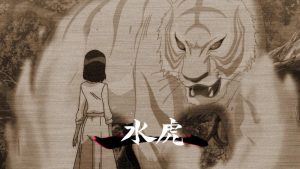 Even the nature of the Suiko itself is on-point – this is a water demon (the name means “child of water”), but he takes the form of a tiger to reflect the rage in the human heart. It’s a great character design to go along with the performance, and the spectacle of the Suiko going all over town sucking out the fluids of Shouko’s enemies and leaving them desiccated husks is quite something. Shouko’s problems can pretty much all be traced back to the Onikubo family – the husband who runs the factory and basically the town, the wife who runs the women’s organization, the son who bullies Ren. They’re awful people, the lot of them – and naturally, Nezumi-Otoko is working for the husband as a secretary.
Even the nature of the Suiko itself is on-point – this is a water demon (the name means “child of water”), but he takes the form of a tiger to reflect the rage in the human heart. It’s a great character design to go along with the performance, and the spectacle of the Suiko going all over town sucking out the fluids of Shouko’s enemies and leaving them desiccated husks is quite something. Shouko’s problems can pretty much all be traced back to the Onikubo family – the husband who runs the factory and basically the town, the wife who runs the women’s organization, the son who bullies Ren. They’re awful people, the lot of them – and naturally, Nezumi-Otoko is working for the husband as a secretary.
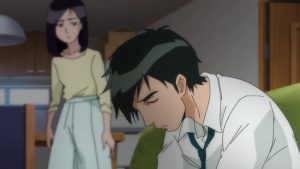 This is a dark ride, to be sure – though it would certainly be much darker if the mummified victims weren’t going to be restored after the Suiko is defeated (the knowledge of which colors the way we view their downfall). The real question in all this is Shouko herself – she may be horrified when the Suiko takes things farther than she’d have wanted and drains her husband and son too, but she didn’t seem at all bothered at all the other people being mummified in her name. The Onikubos are scum and no tears need be shed for them, and indeed the patriarch gets what’s coming to him (thanks to Ratman and his smartphone) but what of Shouko?
This is a dark ride, to be sure – though it would certainly be much darker if the mummified victims weren’t going to be restored after the Suiko is defeated (the knowledge of which colors the way we view their downfall). The real question in all this is Shouko herself – she may be horrified when the Suiko takes things farther than she’d have wanted and drains her husband and son too, but she didn’t seem at all bothered at all the other people being mummified in her name. The Onikubos are scum and no tears need be shed for them, and indeed the patriarch gets what’s coming to him (thanks to Ratman and his smartphone) but what of Shouko?
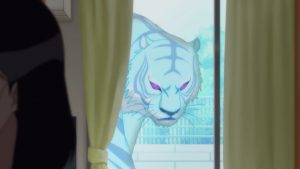 That last question is a tough one. The coda at the end of the episode makes it clear that Suiko isn’t the real villain here, the hate and rage in our hearts is, and that one day he’ll find someone else to start the cycle all over again. But considering everything that happened, Shouko gets off very easily – not only does Nezumi-Otoko make sure the Onikubos can’t take revenge, but Kitarou pulls out all the stops to stop her from finishing what she started at the waterfall. She and her family leave to start a new life elsewhere (which I agree is certainly for the best) but if I were her, I’d be very conscious that her Karmic balance is very much in the red at the moment…
That last question is a tough one. The coda at the end of the episode makes it clear that Suiko isn’t the real villain here, the hate and rage in our hearts is, and that one day he’ll find someone else to start the cycle all over again. But considering everything that happened, Shouko gets off very easily – not only does Nezumi-Otoko make sure the Onikubos can’t take revenge, but Kitarou pulls out all the stops to stop her from finishing what she started at the waterfall. She and her family leave to start a new life elsewhere (which I agree is certainly for the best) but if I were her, I’d be very conscious that her Karmic balance is very much in the red at the moment…


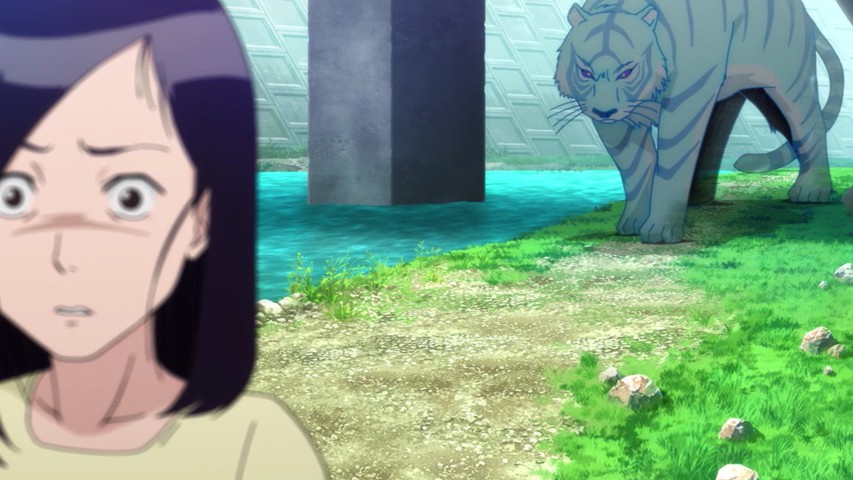
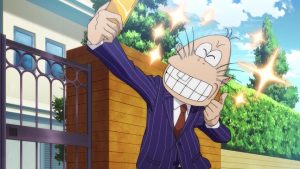
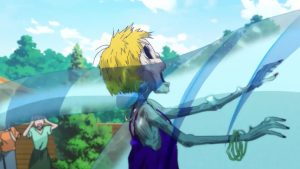
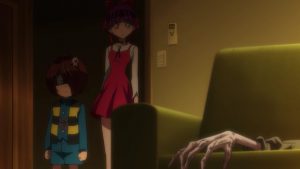
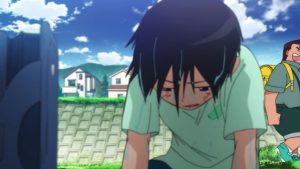
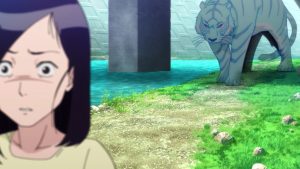
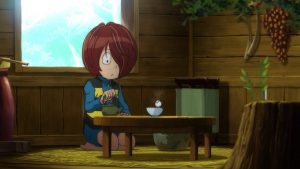
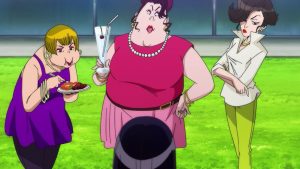
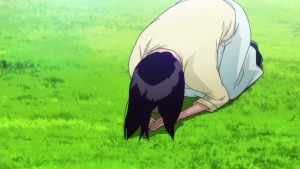
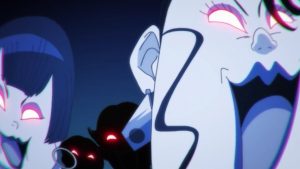
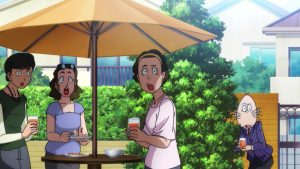
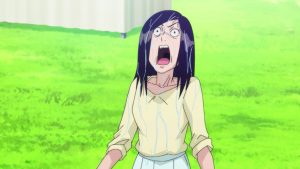
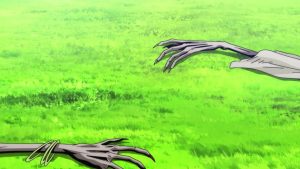
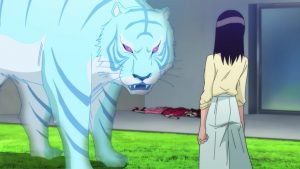
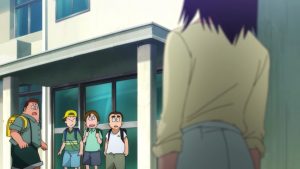
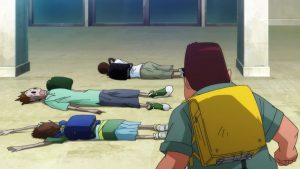
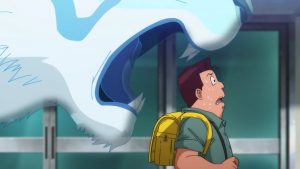
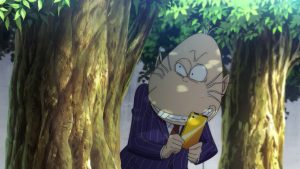
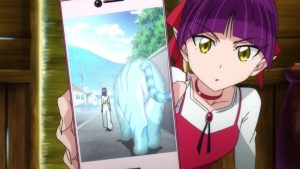
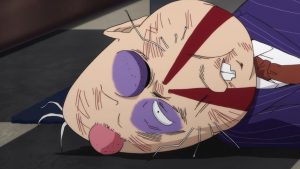
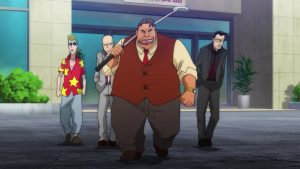
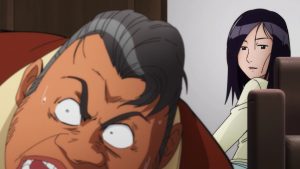
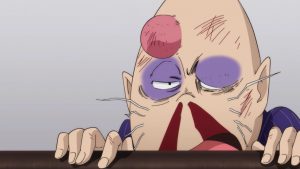
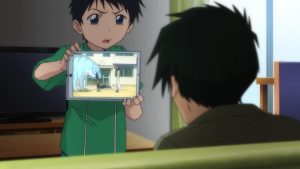
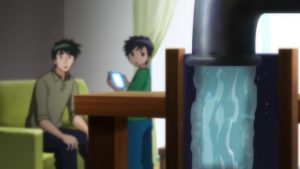
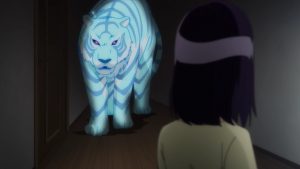
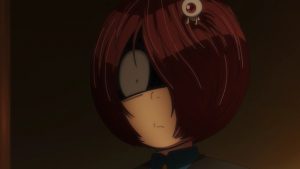
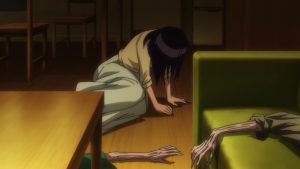
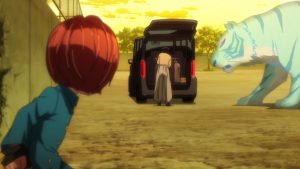
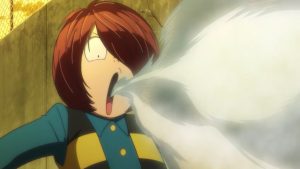
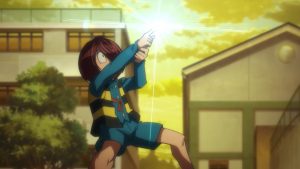
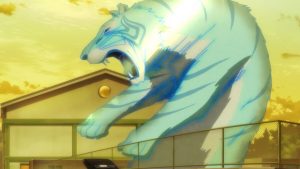
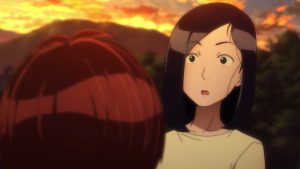
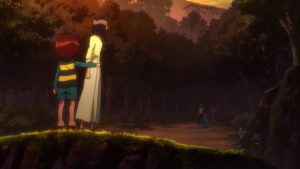
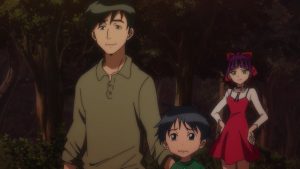
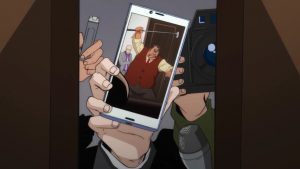
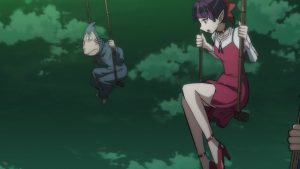
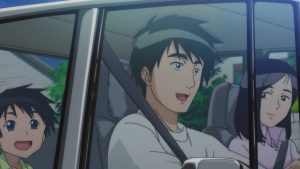

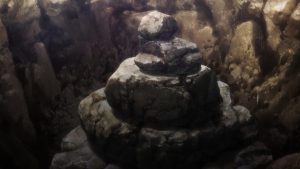
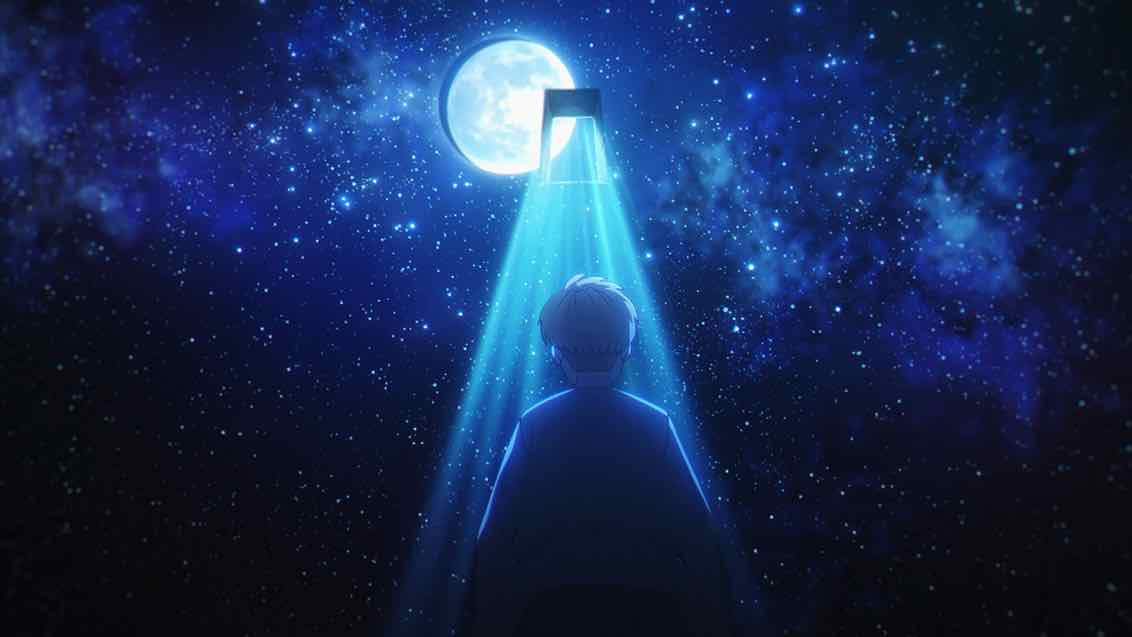
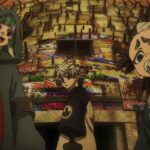
Derrick
July 15, 2019 at 8:10 amso it’s like a person handling nuclear weapon beyond their reach giving disproportional retribution
Enamelthyst
July 15, 2019 at 11:03 pmMan, this episode was a fantastic kick in the pants! I think this is the most gripping “horror mode” episode of this series yet (with the possible exception of 22).
I don’t think I’m entirely behind your condemnation of Shouko, who exhibits all the classic symptoms of depression and is simply latching onto the concept of “revenge” as a chance to feel anything again. The Suiko’s reading of her feelings towards her family is particularly important: he’s entirely right that she feels disconnected with them, except that the change is not in them but in her own inability to experience the joy of family she used to have. It’s true that she should have noticed that she was becoming a rampaging monster, and I think she would have if she were thinking clearly, but in a depressive state one simply can’t care about bad things that happen to other people—one is too concerned with the overwhelming force gripping one’s own soul.
There’s also a subtle but pointed dig at the state of Japanese mental healthcare, and the general unwillingness of people in Japan to sympathize with the mentally ill, in Shouko’s enormous relief that the Suiko will simply listen to her. Denied compassion from her friends and neighbors and professional or medical support, Shouko has no choice but to embrace her darkest emotions and confide in her most destructive instincts. You’re right that things are unlikely to be any better in her new town, but it’s not because she’s being “punished” for her acts of desperation—it’s because she lives in a country where depression is in and of itself a death sentence.